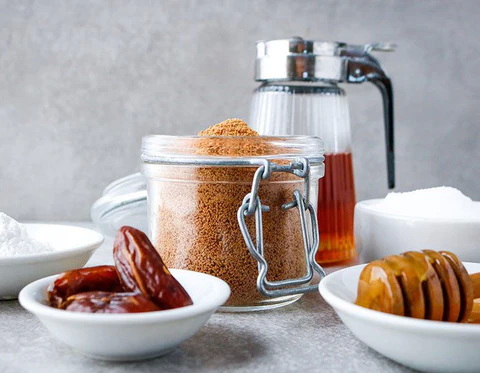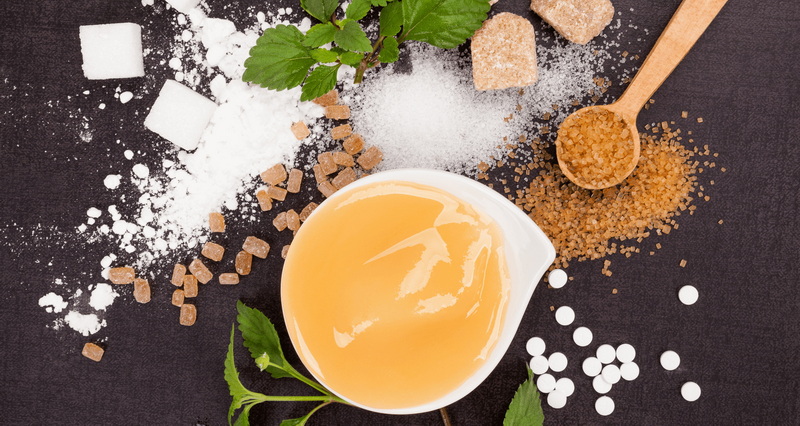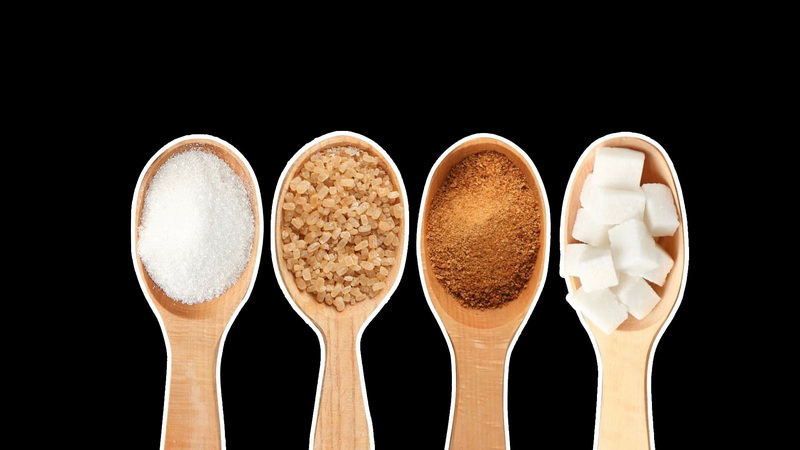Content Menu
● Introduction to Natural Sweeteners in Germany
● Leading Natural Sweeteners Manufacturers in Germany
>> 1. Cargill Incorporated
>> 2. Tate & Lyle
>> 3. Organic Stevia GmbH
>> 4. Sweet Ingredients GmbH
>> 5. Denk Ingredients
>> 6. Atlantic Chemicals Trading GmbH (ACT)
● Popular Natural Sweeteners Produced in Germany
>> Stevia
>> Monk Fruit (Luo Han Guo)
>> Erythritol
>> Coconut Sugar
>> Xylitol and Isomaltulose
● Production Processes of Natural Sweeteners
>> Stevia Processing
>> Monk Fruit Sweetener Production
>> Erythritol Manufacturing
>> Coconut Sugar Production
● Market Trends and Consumer Demand in Germany
● Conclusion
● FAQ
>> 1. What are the main types of natural sweeteners produced in Germany?
>> 2. How is stevia processed into a natural sweetener?
>> 3. What makes monk fruit a popular natural sweetener?
>> 4. Are natural sweeteners like stevia and monk fruit approved for use in Europe?
>> 5. Which industries use natural sweeteners from German manufacturers?
Germany is a leading hub in the global natural sweeteners market, known for its advanced food technology and commitment to health-conscious nutrition. The country hosts numerous manufacturers specializing in natural sweeteners, catering to the increasing demand for healthier sugar alternatives. This article explores the top natural sweeteners manufacturers in Germany, their product offerings, production processes, and market trends. It also includes insights into popular natural sweeteners such as stevia, monk fruit, erythritol, and others, along with detailed explanations to enrich understanding.

Introduction to Natural Sweeteners in Germany
Natural sweeteners are derived from plants and other natural sources, offering alternatives to traditional sugar with fewer calories and health benefits such as a low glycemic index and tooth-friendliness. Germany's food industry, the fourth largest in the country, has seen a significant shift towards natural sweeteners driven by consumer demand for healthier and sustainable nutrition options. This shift has propelled the growth of companies producing natural sweeteners like stevia, monk fruit, erythritol, and coconut sugar.
The rise in lifestyle-related health concerns such as diabetes, obesity, and cardiovascular diseases has further accelerated the adoption of natural sweeteners. Consumers are increasingly seeking products that not only satisfy their sweet cravings but also contribute to overall wellness. This trend is reflected in the German market, where natural sweeteners are becoming integral ingredients in a wide range of food and beverage products, including soft drinks, baked goods, dairy products, and confectionery.
Leading Natural Sweeteners Manufacturers in Germany
1. Cargill Incorporated
Cargill is a global leader in food ingredients and has a strong presence in Germany's natural sweeteners market. The company produces a wide range of natural sweeteners, including stevia extracts and erythritol, focusing on innovative, low-calorie sugar substitutes that meet regulatory approvals in Europe and the US. Cargill's extensive R&D capabilities enable it to offer customized sweetener solutions for various food and beverage applications. Their commitment to sustainability and quality control ensures that their natural sweeteners meet the highest standards demanded by health-conscious consumers and regulatory bodies alike.
2. Tate & Lyle
Tate & Lyle is another major player in Germany, specializing in natural sweeteners such as stevia and isomalt. The company emphasizes sustainable production and offers products that cater to the bakery, confectionery, and beverage industries. Tate & Lyle's natural sweeteners are known for their quality and ability to enhance product taste while reducing calorie content. Their innovative approach includes blending natural sweeteners to optimize sweetness profiles and minimize aftertastes, meeting the sensory expectations of consumers.
3. Organic Stevia GmbH
Organic Stevia GmbH focuses exclusively on stevia-based natural sweeteners. The company supplies high-purity stevia extracts that are widely used in food, beverage, and pharmaceutical sectors. Their products are favored for being organic and non-GMO, aligning with the growing consumer preference for clean-label ingredients. The company's dedication to organic farming practices and sustainable sourcing ensures that their stevia products are not only natural but also environmentally responsible.
4. Sweet Ingredients GmbH
Sweet Ingredients GmbH is a consulting distributor and wholesaler specializing in natural sweeteners like xylitol, organic coconut sugar, and isomaltulose. Their product range supports manufacturers in optimizing production processes and improving product outcomes. Sweet Ingredients serves diverse sectors, including baked goods, confectionery, beverages, pharmaceuticals, and cosmetics. Their expertise in ingredient functionality helps clients develop products that meet both nutritional and sensory demands.
5. Denk Ingredients
Denk Ingredients offers a variety of natural sweeteners, including erythritol and stevia extracts. The company is recognized for its expertise in ingredient innovation and quality assurance, providing solutions that meet the evolving needs of the natural sweetener market. Denk Ingredients also collaborates closely with food manufacturers to tailor sweetener blends that enhance taste and texture while reducing sugar content.
6. Atlantic Chemicals Trading GmbH (ACT)
ACT specializes in monk fruit (Luo Han Guo) sweeteners, offering various mogroside concentrations for use in dairy, confectionery, beverages, and sports nutrition. Monk fruit is gaining popularity due to its intense sweetness and zero-calorie profile. ACT ensures quality through rigorous supply chain inspection and quality management. Their focus on traceability and transparency appeals to brands that prioritize clean-label and natural product claims.

Popular Natural Sweeteners Produced in Germany
Stevia
Stevia is the largest and fastest-growing segment in Germany's natural sweetener market. It is derived from the leaves of the Stevia rebaudiana plant and contains steviol glycosides responsible for its sweetness. Stevia is favored for being calorie-free and having a low glycemic index. The production process involves harvesting, drying, grinding, and extracting the sweet compounds, which are then purified into powder or liquid forms suitable for food and beverage applications.
Stevia's versatility allows it to be used in a variety of products, from beverages and dairy to baked goods and confectionery. Manufacturers often blend stevia with other natural sweeteners to balance sweetness intensity and reduce any lingering bitter aftertaste. Its natural origin and regulatory approvals have made it a staple ingredient in sugar reduction strategies across the German food industry.
Monk Fruit (Luo Han Guo)
Monk fruit sweetener is extracted from the monk fruit, native to China but increasingly produced and processed for the European market. It is about 300 times sweeter than sugar and contains mogrosides, which provide sweetness without calories or aftertaste. The production process includes harvesting, cleaning, juice extraction, filtration, concentration, and drying into powder or liquid sweeteners.
Monk fruit sweeteners are prized for their clean taste and suitability for diabetic-friendly and ketogenic diets. In Germany, the growing awareness of monk fruit's benefits has led to increased incorporation into functional foods and beverages. Manufacturers appreciate its stability across a wide pH range and heat tolerance, making it suitable for various processing conditions.
Erythritol
Erythritol is a sugar alcohol produced commercially by fermenting glucose derived from starch. It has about 60-70% of the sweetness of sugar but with almost zero calories. The production process involves hydrolysis, fermentation, filtration, purification, concentration, drying, and crystallization to yield a high-purity erythritol powder.
Erythritol is widely used in combination with other natural sweeteners to enhance sweetness and improve mouthfeel. Its non-cariogenic properties make it popular in oral care products and sugar-free confectionery. German manufacturers leverage erythritol's cooling effect and excellent digestive tolerance compared to other polyols.
Coconut Sugar
Coconut sugar is made from the sap of coconut palm flowers and is valued for its caramel-like flavor and lower glycemic index compared to regular sugar. Its production involves collecting sap, heating to evaporate moisture, and granulating into sugar crystals.
Though less intensely sweet than stevia or monk fruit, coconut sugar is favored for its natural composition and trace minerals. It appeals to consumers seeking minimally processed sweeteners with a rich flavor profile. German natural sweetener manufacturers include coconut sugar in their portfolios to offer diverse options catering to different taste preferences.
Xylitol and Isomaltulose
Xylitol, another sugar alcohol, is produced from birch wood or corn cobs and is known for its dental benefits and sweetness similar to sugar. Isomaltulose, derived from sucrose, is a slowly digestible carbohydrate offering sustained energy release and low glycemic response.
These sweeteners are increasingly incorporated into specialty products such as sugar-free chewing gum, sports nutrition, and diabetic-friendly foods. German manufacturers provide these options to meet niche market demands and enhance product functionality.
Production Processes of Natural Sweeteners
Stevia Processing
Stevia leaves are harvested after reaching maturity, dried to reduce moisture, ground into powder, and then refined to extract steviol glycosides. This process ensures a potent, fine powder that can be used as a natural sweetener in various products. The extraction involves water or ethanol-based methods, followed by purification steps including filtration and crystallization to achieve high purity and consistent sweetness levels.
Monk Fruit Sweetener Production
The monk fruit is harvested and cleaned, then crushed to extract juice. The juice is heated with water to extract mogrosides, filtered to remove impurities, and concentrated by drying methods like spray drying or freeze drying. The final product is a high-quality, zero-calorie sweetener. The process preserves the natural sweetness while removing unwanted flavors and components.
Erythritol Manufacturing
Erythritol production starts with starch hydrolysis to glucose, followed by fermentation with osmophilic yeast. The mixture is filtered to remove microorganisms, purified to separate erythritol from other polyols, and then concentrated and crystallized into powder. This multi-step process ensures high purity and excellent solubility, making erythritol suitable for a broad range of applications.
Coconut Sugar Production
Coconut sugar production involves collecting the sap from coconut palm flowers, which is then heated to evaporate water content. The concentrated syrup is cooled and granulated into sugar crystals. This minimally processed method retains natural minerals and nutrients, distinguishing coconut sugar from refined white sugar.
Market Trends and Consumer Demand in Germany
Germany's natural sweetener market is characterized by a growing preference for healthier and sustainable nutrition. Stevia dominates the market due to regulatory approvals and consumer acceptance. The demand for natural sweeteners is driving innovation, with companies investing in new production plants and product launches to meet global and local needs.
The market is also witnessing slow growth in bulk sweeteners, as they are increasingly replaced by low-calorie, natural alternatives. Companies like Cargill, Tate & Lyle, and Organic Stevia GmbH hold significant market shares due to their comprehensive product portfolios and strong distribution networks.
Sustainability is a key focus for German manufacturers, who are adopting eco-friendly farming, extraction, and packaging methods. Consumers are also demanding transparency in sourcing and production, pushing companies to provide traceability and clean-label certifications.
The rise of plant-based diets and
functional foods further boosts the demand for natural sweeteners, as they fit well within these health-conscious lifestyles. Additionally, the growing popularity of ketogenic and diabetic-friendly diets in Germany has encouraged manufacturers to develop sweetener blends that cater specifically to these markets.
Conclusion
Germany stands out as a key player in the natural sweeteners industry, hosting some of the top manufacturers who supply high-quality, innovative, and health-oriented sweetener products globally. The country's focus on sustainability, health trends, and regulatory compliance has fostered a vibrant market for natural sweeteners such as stevia, monk fruit, erythritol, and coconut sugar. As consumer demand for natural and low-calorie sweeteners continues to rise, German manufacturers are well-positioned to lead the global market with their expertise and advanced production technologies. Their commitment to innovation, quality, and sustainability ensures that natural sweeteners will remain a vital part of the food and beverage industry's future.

FAQ
1. What are the main types of natural sweeteners produced in Germany?
Germany produces various natural sweeteners including stevia extracts, monk fruit sweeteners, erythritol, xylitol, and coconut sugar, catering to diverse food and beverage applications.
2. How is stevia processed into a natural sweetener?
Stevia leaves are harvested, dried, ground into powder, and then extracted to isolate steviol glycosides, which are purified into sweetener powders or liquids.
3. What makes monk fruit a popular natural sweetener?
Monk fruit is about 300 times sweeter than sugar, contains zero calories, and has no unpleasant aftertaste, making it a favored natural sweetener in health-conscious markets.
4. Are natural sweeteners like stevia and monk fruit approved for use in Europe?
Yes, stevia is widely approved and used in Europe, and monk fruit approval as a Novel Food is expected imminently, facilitating its market growth.
5. Which industries use natural sweeteners from German manufacturers?
Natural sweeteners from Germany are used in food and beverage manufacturing, pharmaceuticals, cosmetics, confectionery, bakery, and sports nutrition sectors.






























